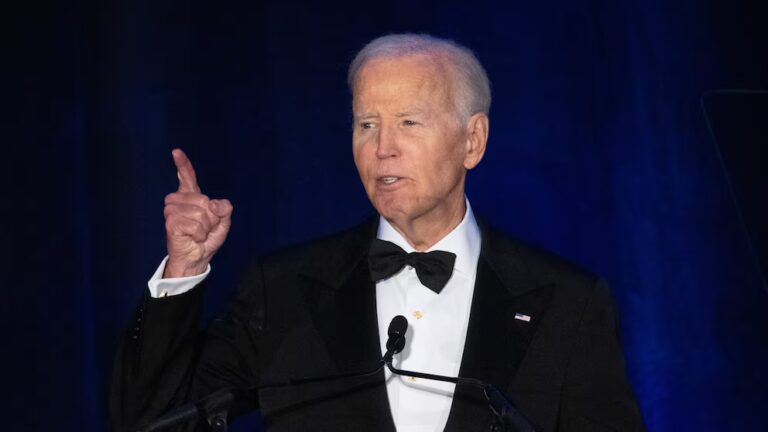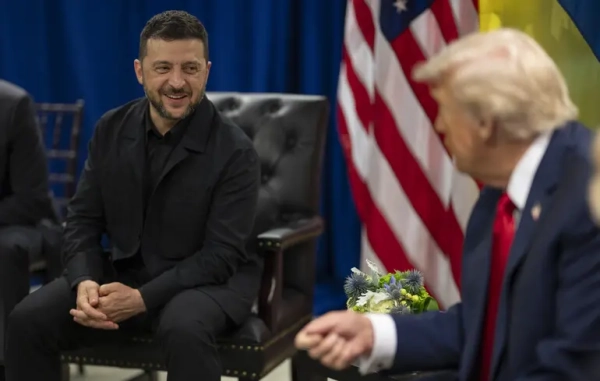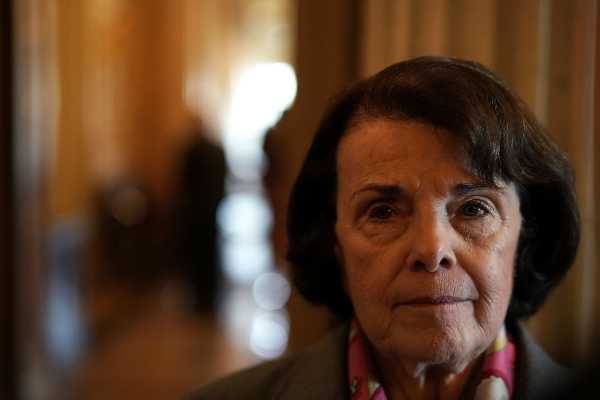
California’s Dianne Feinstein, first elected in 1992, is one of the most powerful Democrats in the Senate. But she’s also one of the few with a credible primary challenger — who came within 6 points of securing the nomination at the California Democratic Party convention in February, where delegates handed Feinstein a startling rebuke by declining to endorse her.
The challenger, 51-year-old state Sen. Kevin de León, stands out in a very crowded field of relatively unknown candidates in the June 5 Democratic primary. Still, his attempt to beat Feinstein is a race with David and Goliath-like odds, California political science experts say.
Feinstein is an institution: She was elected to the San Francisco Board of Supervisors in 1969 and became San Francisco mayor 10 years later. Now, she’s ranking member of the powerful Senate Judiciary Committee, and at age 84 (the oldest US senator), she’s seeking her sixth term.
But because of California’s “top two” primary system, as long as de Léon can slide into second place along Feinstein, he’ll be challenging her all the way until November — speaking for some California progressives who believe that a powerful senator from a deep-blue state should be a louder voice in opposition to Trump’s agenda.
Why Feinstein is facing a rare primary challenge
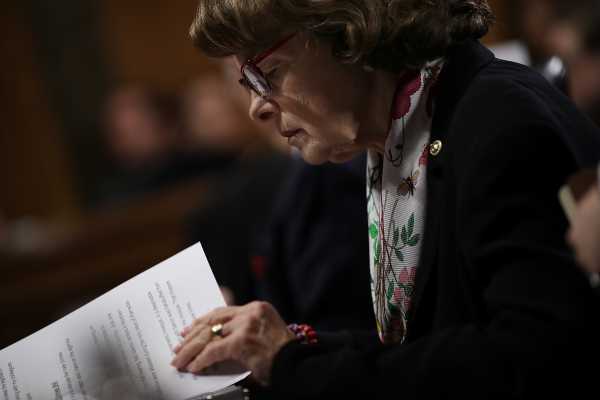
California has been the epicenter of the Trump resistance movement, and Feinstein is a frequent target among progressive groups for not taking a hard enough line against the president.
Her comments that she believed Trump “can be a good president” if he was open to change caught plenty of flak, but progressives’ disagreements with her go deeper. They run the gamut from her opposition to a single-payer health care bill to her support of the controversial Foreign Intelligence Surveillance Act (FISA) and her past vote in favor of the Iraq war.
And in some ways, Feinstein seems to be feeling the heat; in recent months, she’s moved left on the death penalty, saying she now opposes capital punishment after supporting it for many years — and even running on the issue in early Senate campaigns.
Feinstein is saddled with “the perception of being out of date,” said David Mermin, a longtime political strategist in California.
“People won’t say age, but she’s the oldest member of the Senate,” he added. “So when voters do think about people who have been in office for a long time, they don’t say they’re old; they say they’re out of date.”
The California Democratic Party convention showed at least some segment of state Democrats agreed.
“A lot of Democrats gave us a lot of wind behind our sails, with the belief that it is time for a change,” de León told me in his state Senate office in Sacramento recently. “It’s time to have a voice that’s reflective of today’s California, not the California of a quarter-century ago.”
De León is presenting himself as that alternative: more progressive policy-wise, and more willing to openly be a thorn in Trump’s side.
But on the whole, Feinstein will be hard to beat. She’s reasonably well-liked and has a war chest of more than $10 million to blanket California’s airwaves with. Plus, despite whatever California Democratic Party delegates might be feeling, national Democrats have no interest in a primary defeat against Feinstein. She’s a safe, reliable seat and an important person in the national party.
Plus, as the top Democrat on the Senate Judiciary, she’s an important part of protecting special counsel Robert Mueller’s investigation into possible Russian collusion with the Trump campaign.
“He’s got a real campaign, but … I haven’t seen a wholesale of Democrats overwhelmingly abandoning Feinstein,” said Mermin.
Who is Kevin de León?
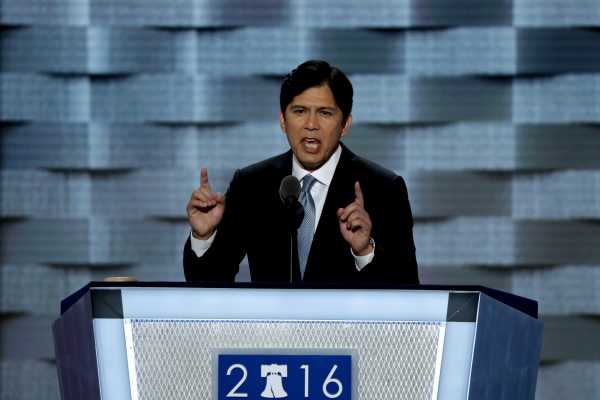
De León grew up in San Diego as the son of a single immigrant mother. He worked in the state for years as a labor organizer before entering California state politics in 2006.
In Sacramento, he started in the state assembly and then moved to the state Senate, becoming president pro tempore of the chamber in 2014. Throughout the years, he helped advance a number of piece of legislation focused on combating climate change, cutting tax loopholes, and promoting gun control. De León also was instrumental in passing a single-payer bill in California, which ultimately was stopped by fellow Democratic lawmakers due to a lack of funding. (He supports the current federal bills for single-payer as well.)
De León is term-limited and resigned to run for US Senate this year. He said he was motivated by President Donald Trump’s rise to do his part to attempt to bring the California resistance to DC.
“It is true that I am termed out at the end of this year, but there wasn’t a lot of thinking into 2018,” he said. “We need a strong voice on the front lines, not on the sidelines, to deal with someone like Donald Trump.”
But the fact remains that in California, de León and his fellow state lawmakers have been able to enact a progressive agenda, something that liberal Democrats can only dream about doing in Republican-controlled, gridlocked Washington. And he doesn’t talk about DC — and the politicians and journalists that populate it — glowingly.
“Washington, DC, gets caught up in itself. It’s a very insular town that is really into itself,” he said. “Victory or a sign of great achievement is a sign of how many times you’ve been on the news media as opposed to a work product.”
So the question remains: Why does he want to go to Washington — where things move much more slowly and it is arguably a lot more difficult to pull off what he’s already been able to achieve in California?
“I’ve always believed it’s not about moving more to the left or more to the right, but it’s about moving forward with commonsense measures, policies that truly improve the human condition for all Americans, regardless of who you are,” he said.
De León is running to the left of Feinstein, but he doesn’t want to be labeled a lefty
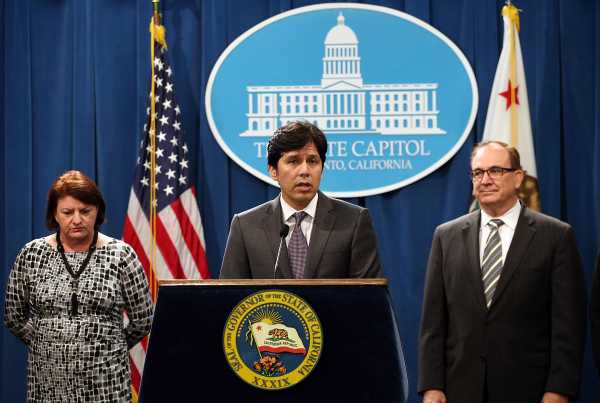
There’s no denying Feinstein is a centrist Democrat, and despite California’s super-liberal reputation, she’s been able to win elections year after year.
“I think she’s viewed as someone who is very widely respected by people within a wide range of ideologies,” said California Democratic political consultant Erica Walters. “[With] voters, she’s viewed as someone that gets it done for California.”
In addition to capturing Democrats, Feinstein is able to pick up a portion of the state’s independent voters. Those blocs have delivered her resounding victories in past years; the last time she ran, in 2012, she won nearly 7.3 million votes, clinching more than 62 percent of the vote.
While Feinstein has scooped up the endorsements of former President Barack Obama, fellow California Sen. Kamala Harris, and House Minority Leader Nancy Pelosi, de León has the support of the climate action group 350.org, prominent Democratic billionaire Tom Steyer, and key labor groups. But gaining the support of the activist base does not a successful primary challenge make, according to Mermin.
He “definitely has a lot of support among the activist base of the party,” he said. “But that activist base, I don’t think it’s the majority of the Democratic Party.”
De León, meanwhile, says the media has stuck him with the progressive label, but he’s only too happy to highlight where he’d like to work with Republicans on issues including immigration and climate change. He admits he is a progressive but insists these are issues he’s been fighting for his whole life — and ones that apply to all people living in the US, no matter what political party they belong to.
“When we talk about health care and Medicare for all, it’s not about a Democratic or Republican issue; health care is health care. And having access to quality health care benefits all individuals,” he said. “I think what people try to do, especially political pundits, is trivialize and marginalize Democratic activists.”
“In short of being successful or in short of coming up with majorities in the legislative branch in Congress, work toward negotiating with Republican colleagues in saying this is a win-win situation,” he argues.
He knows that he’s facing an incredibly tough fight to get there. De León doesn’t have a lot of money or name recognition, but right now he’s focused on taking small steps to November.
“Our immediate goal is to go from 32 candidates to two candidates,” de León said. “If we’re successful in achieving that, then we have a different ballgame. … First things first, I don’t want to get ahead of myself.”
Sourse: vox.com

